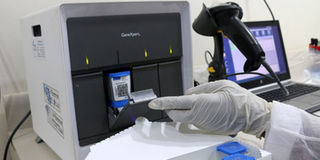Increasing TB awareness is vital

On behalf of TWENDE consortium, I write in response to the article, ‘TB machines are fully utilised’ (New vision, December 20). The Ministry of Health through their public relations officer should be applauded for responding to the December 18 story that stating the extent to which TB testing machines are being utilised in Uganda.
My biggest take from the ministry’s story is their willingness to inform the public about the availability of the TB tests and plans to increase the coverage of these tests in Uganda. TWENDE study found that the awareness of TB and interventions thereof, is low not only in Uganda, but also in Kenya and Tanzania. Efforts to increase public awareness concurs with the TWENDE study recommendations.
However, the debate should not be whether the TB machines are or are not fully utilised. Since the ministry agrees that, for example, the utilisation of GeneXpert machines is at 60 per cent, the debate should be on what lessons we can draw from this situation so as to achieve 100 per cent utilisation. This is what TWENDE is about, to understand and overcome barriers and thus increase uptake and accessibility of healthcare interventions starting with the TB diagnostics. A policy brief on how to increase accessibility and utilisation of TB tests has been written and will be submitted to the Ministry of Health and Parliamentary Health Services Committee for consideration and hopefully, adoption into policy and practice.
I cannot agree more that the Line Probe Assay (LPA) is not a first entry test for TB. This is the reason why, the World Health Organisation approved it for use at regional hospital level and purposely to increase the detection of multi-drug resistant tuberculosis. The question we should be asking is not whether LPA is a primary or secondary test, but whether Uganda is equipped enough to detect multi-drug resistant tuberculosis? The answers to this question will guide us on whether we need to increase capacity in this area or not.
TB kills slowly and hardly makes news headlines. All stakeholders that TWENDE interacted with in Kenya, Tanzania and Uganda agree that awareness and knowledge of the burden of TB and its devastating impact is low not only in the public, but also among healthcare practitioners and policy makers. Increasing awareness will reduce stigma, increase suspicion index among healthcare practitioners, domestic financing for TB control services by the government, and public accessibility and use of TB diagnostic and treatment services, and thus put Uganda on the road to ending TB.
Dr Wilber Sabiiti,
University of St Andrews, UK




